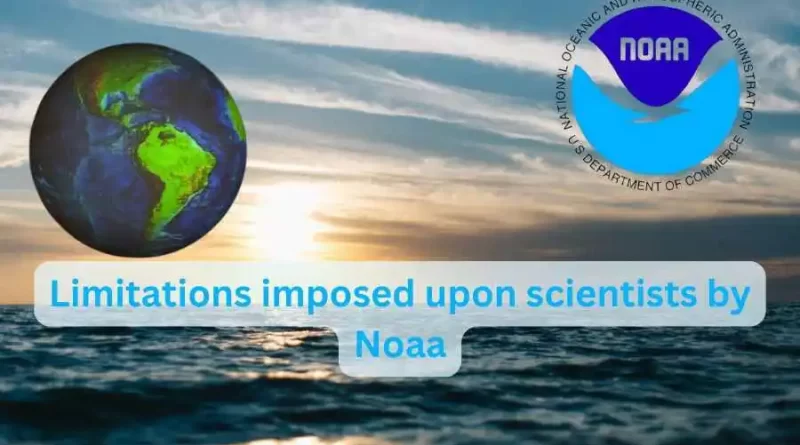NOAA cuts may disrupt global forecasts
It all began last week with Noaa’s research office sending a message to the staff asking for an effective action. The next step is to keep a tab on the emails and ‘virtual meetings’ with foreign nationals, according to current and former high-level Noaa scientists and officials. Creating a sense of unease in the agency, the latest developments have also alarmed European climate agencies, the scientists told one of the leading newspapers.
Global forecasts are going to be haywire from now onwards, as the Trump administration begins yet another departmental control spree. The main area of concern, however, with the scientists and the European nations alike is, the quality and availability of world weather forecasts. A crackdown on climate is predicted as tabs are now being kept on the agency staffer’s emails and meetings.
A senior Noaa scientist said, “My expectation is that it’s going to be a crackdown on climate. People are just somewhere between disturbed and terrified.” Currently, global weather data which is provided in the form of a constant stream to the nations, is going to be dealt with by a Trump political appointee.
Limitations imposed upon scientists by Noaa
The data is provided free to the world as part of a goodwill gesture. The new Noaa directive though, isn’t going to prevent the scientists from any foreign collaboration, yet at the same time, the NWS (National Weather Service) is under the spotlight.
Greg Carbin, former chief of the forecast operations branch for the NWS’s weather prediction center, said that the restrictions at Noaa can’t lead to cost-saving measures. According to him, the NWS is valuable to society and cost-cutting can only impede the flow of data worldwide. An adverse global impact might follow from this.
Many steps intended to privatize the NWS by Trump’s inner circle will reduce government spending and thus, efforts towards mitigating the climate crisis. According to a recent study, every dollar invested in the NWS produces $73 for the American people, apart from the freely available climate data.
Carbin added, “Investing in weather and climate services is not a cost – it is an essential safeguard for the nation’s security, economy and wellbeing. Cutting these services now would be a reckless decision that would cost far more in lives and damages than it would ever save on a balance sheet.”
As per sources at Noaa, freezing the hiring process entirely and budget cuts combined with additional administrative burden, will only decelerate the US ability to maintain a functioning public weather service.
Carbin added again, “Accurate forecasts protect lives, mitigate billions of dollars in disaster-related damages, and enable businesses, from agriculture to transportation, to operate more efficiently.”
Also, on a case-by-case basis, a Trump appointee has asked Noaa employees to document ‘all international engagements’ in an internal spreadsheet. The agency scientist said, “We haven’t stopped anything yet, but it’s a crazy amount of stuff to do. Working internationally is so routine, it’s just hardly thought of.”
On a condition of anonymity, the scientist said, “It’s a difficult time to be a federal employee right now.” In the name of strengthening the US economy, the Trump administration is increasingly relying on cuts and staff reduction in the agency.
To gather what exactly the new changes at Noaa would translate as for the European scientists, are in waiting. The impact on their work by the agency developments is something which they are worried about to date, whatever they heard from their US colleagues.
Nicolas Bousserez, an atmospheric scientist at EU’s Copernicus agency said, “One of the most concerning aspects of this situation is the availability of US datasets for environmental science, particularly in weather forecasting and climate science.” He wasn’t though, speaking on behalf of the agency.
As per Bousserez, it wasn’t clear whether the data access might be restricted or not, but, “such an extreme scenario remains plausible and could have significant consequences.”
According to a climate scientist from EU’s Copernicus agency on the condition of anonymity, “the climate crisis knows no boundaries, and halting international scientific collaboration can only undermine our ability to understand and combat it.” The scientist said that he was ‘appalled and saddened’ when he heard about the news last week.
Peter Thorne, climate scientist at Maynooth University (Ireland), who has collaborated with Copernicus and Noaa says that the US has always played more than an important role in climate and weather science for decades. Especially, in fundamental climate observations and “it’s not as if in a worst case of Noaa going dark, everything would be sent into an existential crisis … [but] it would not be pretty.” Noaa was unavailable for any comments.
Apart from budgetary and staffing cuts in the Noaa as of now, Russell Vought (Director of the United States Office of Management and Budget) has proposed a 38% cut in the costs.
A report from a news channel says that it was done “to curb excessive mission creep in key agencies, halt steadily increasing climate extremism within the department, and eliminate the prioritization of ‘woke’ agendas.”
It would definitely burden the agency even further as the report again says, “current employees have been told to expect a 50% reduction in staff and budget cuts of 30%.” Diversity, equity and inclusion have been eradicated, as Elon Musk’s DOGE earlier this month initiated the cost-cutting steps.
The Noaa staff have also been told to abide by a list compilation about climate-related programs. These are funded and operated by the agency.
As per an estimation of a senior Noaa official, hundreds of staff members have been bought out by the federal government. Currently, 4,500 scientists and technicians are employed by the agency whose climate-related activities are spread out in the whole world.
Their focus revolves around maximizing the benefits of science for the world. Carbin said, “If the proposed cuts to Noaa and NWS are enacted, the consequences will be severe. It will lead to less accurate and slower weather forecasts and warnings–putting lives and property at risk.”








